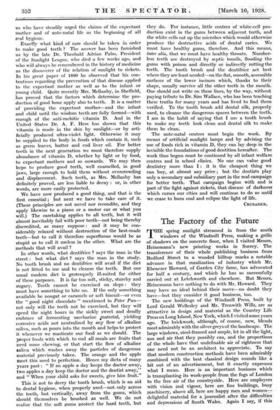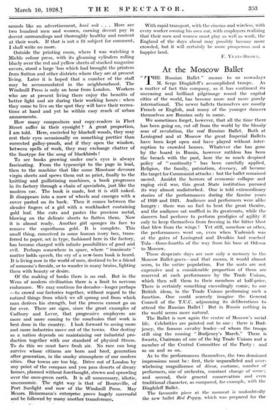The Factory of the Future T HE spring sunlight streamed in
from the south windows of the Windmill Press, making a grille of shadows on the concrete floor, when I visited Messrs. Heinemann's new printing works in Surrey. The transference of their whole publishing business from Bedford Street to a wooded hilltop marks a notable advance in that ruralization of industry which Mr. Ebenezer Howard, of Garden City fame, has advocated for half a century, and which he has so successfully carried out at Letchworth and elsewhere. But Messrs. Heinemann have nothing to do with Mr. Howard. They may have an ideal behind their move—no doubt they have—but they consider it good business, too.
The new buildings of the Windmill Press, built by Lord Gerald Wellesley and Mr. Trenwith Wills, are as attractive in design and material as the Country Life Press on Long Island, New York, which I visited some years ago. The brickwork, although, of course, new, blends most admirably with the silver greys of the landscape. The large windows, steel-framed and ample, let in all the light, sun and air that they possibly can, and the proportions of the whole have that undefinable air of rightness that one need not be an architect to Appreciate. To say that modern construction methods have been admirably combined with the best classical design sounds like a bit out of an advertisement, but it exactly expresses what I mean. Here is an important business which is transplanting its work-people from the fogs of London to the free air of the countryside. Here are employers with vision and vigour, here are, fine buildings, busy machinery, above all, here are happy men the women-delightful material for n journalist after the difficulties and depressions of South Wales. Again I say, if this sounds lie an advertisement, honi soit . . . Here are two hundred men and women, earning decent pay in decent surroundings and thoroughly healthy and content at their work. If that is not a fit subject for comment, I shall write no more.
Outside the printing room, where I was watching a Miehk colour press, with its gleaming cylinders rolling bluely over the red and yellow sheets of stacked magazine covers, stood a large 'bus which had brought the printers from Sutton and other districts where they are at present living. Later it is hoped that a number of the staff may be accommodated in the neighbourhood. The Windmill Press is only an hour from London. Workers who are at present living there enjoy the benefits of better light and air during their working hours : when they come to live on the spot they will have their recrea- tions at hand and yet be within easy reach of urban amusements.
How many compositors and copy-readers in Fleet Street suffer iii their eyesight ? A great proportion, I am told. Here, encircled by bluebell woods, they may rest their eyes occasionally on something prettier than corrected galley-proofs, and if they open the window, between spells of- work, they may exchange chatter of the linotype fOr the song of blackbirds I To see books growing under one's eyes is always fascinating. From the typescript to the page in lead, then to the machine that like some Minotaur devours virgin sheets and spews them, out as print, finally to the knitting and guillotining machines, a book progresses in its factory through a chain of specialists, just like the modern car. The book is made, but it is still naked. It disappears into a maw of wheels and emerges with a cover pasted on its back. Then it comes between the slender fingers of a girl with a workbasket containing gold leaf. She cuts and pastes the precious metal, blowing on the delicate sheets to flatten them. Now it is almost ready. Another girl sponges its face to remove the superfluous gold. It is complete. This small thing, conceived in some human ivory box, trans- ferred to paper,‘set in type, fashioned here in the factory, has become charged with infinite possibilities of good and evil. Perhaps somewhere in space, where " inanimate " matter holds speech, the cry of a new-born book is heard. It is living now in the world of men, destined to be a friend of someone's fireside, or to wander in many brains, lighting them with beauty or desire.
Of the making of books there is no end. But in the Wens of modern civilization there is a limit to nervous endurance. We may continue for decades—longer perhaps —to crowd our factories together, without regard to the natural things from which we all sprang and from which man derives his strength, but the process cannot go on for ever. There are signs, since the great examples of Cadbury and Lever, that progressive employers are more and more coming to the conclusion that work is best done in the country. I look forward to seeing more and more industries move out of the towns. Our destiny as a nation depends on maintaining our industrial pro- duction together with' our standard of physical fitness. To do this we must have fresh air. No race can long survive whose citizens are born and bred, generation after generation, in the smoky atmosphere of our modern cities. Our towns are too big. Drive out of London by any point of the compass and you pass deserts of dreary houses, planned without forethought, strewn and sprawling over the once-green earth. It is all unnecessary, idiotic, uneconomic. The right way is that of Bournville, of Port Sunlight and now of the Windmill Press. May Messrs. fleine.mann's enterprise prove hugely successful and be followed by many another transference. With rapid transport, with the cinema and wireless, with every worker owning his own car, with employers realizing that their men and women must play as well as work, the England of the days ahead may possibly become more crowded, but it will certainly be more prosperous and a



























































 Previous page
Previous page